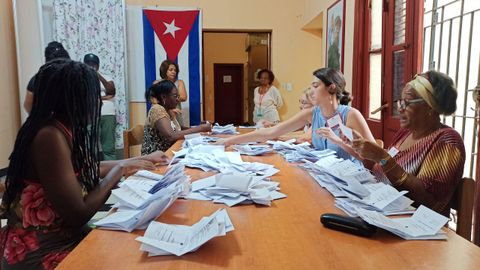
Counting of votes in a school in Havana Ernesto Mastrascusa | EFE
75.92% of Cubans voted, ten points less than in the 2018 parliamentary elections.
AND 75.92% Cubans with the right to vote went to the polls on Sunday, according to Cuba’s National Electoral Council, which reported a preliminary turnout of 6,164,876 voters in the general elections for the National Assembly of the people’s government, which will later determine the president.
Although the regime portrays this as a victory, the truth is that this figure is far from the historical overwhelming majority and this is a noticeable drop compared to the previous elections of this type in 2018, when 7,399,891 people participated, more than 85%.
In a country where it is very difficult not to go with the flow despite multiple pressures and coercions from the workplace, studies and political organizations in the community, this “refrain from punishment” is already remarkable. According to lawyer Eloy Viera Cañive, coordinator of independent media Legal touchthis indicates that “there is a position, an electorate that is no longer undecided, that may not have a more open political position, but takes it before the elections by abstaining”.
Although there is no way to verify them, many doubt the official figures, which do not seem to agree with what is seen on the streets and in polling stationspractically empty for a good part of the daywhich is why it was necessary to extend the voting time by one hour without justifiable reasons.
Despite the obstacles and repression, various activists and independent organizations managed to collect some concrete information, in places where the numbers do not match. Cuba’s Electoral Defense Commission reported, for example, that in the Havana neighborhood of El Cotorro, the final vote count showed participation of only 30% of the voter list.
Other information from different places at different times of the day also showed a noticeable difference compared to the official results of those moments. Among them, at the municipal college 10 de Octubre where the candidate is Foreign Affairs Minister Bruno Rodríguez, just two hours before the end of extended working hours, just over 17 percent of votes were counted.
On the other hand, three independent non-governmental election observation organizations were described parliamentary elections this Sunday in Cuba as “most irregular” in the country since 1976, the Efe agency announced. In a joint statement, the organizations Observers of Electoral Rights, the Cuban Commission for Electoral Defense and Citizen Observers of Electoral Processes condemned the “anomalies” in the electoral law, the use of “coercive” tactics and actions of “repression” against activists and independent observers.
Although the final results have yet to be seen, they will not change the composition of the Assembly at all, because even with a much larger majority of abstentions or votes against, 470 candidates would be confirmed by the deputies.
Source: La Vozde Galicia
I am Amelia James, a passionate journalist with a deep-rooted interest in current affairs. I have more than five years of experience in the media industry, working both as an author and editor for 24 Instant News. My main focus lies in international news, particularly regional conflicts and political issues around the world.







